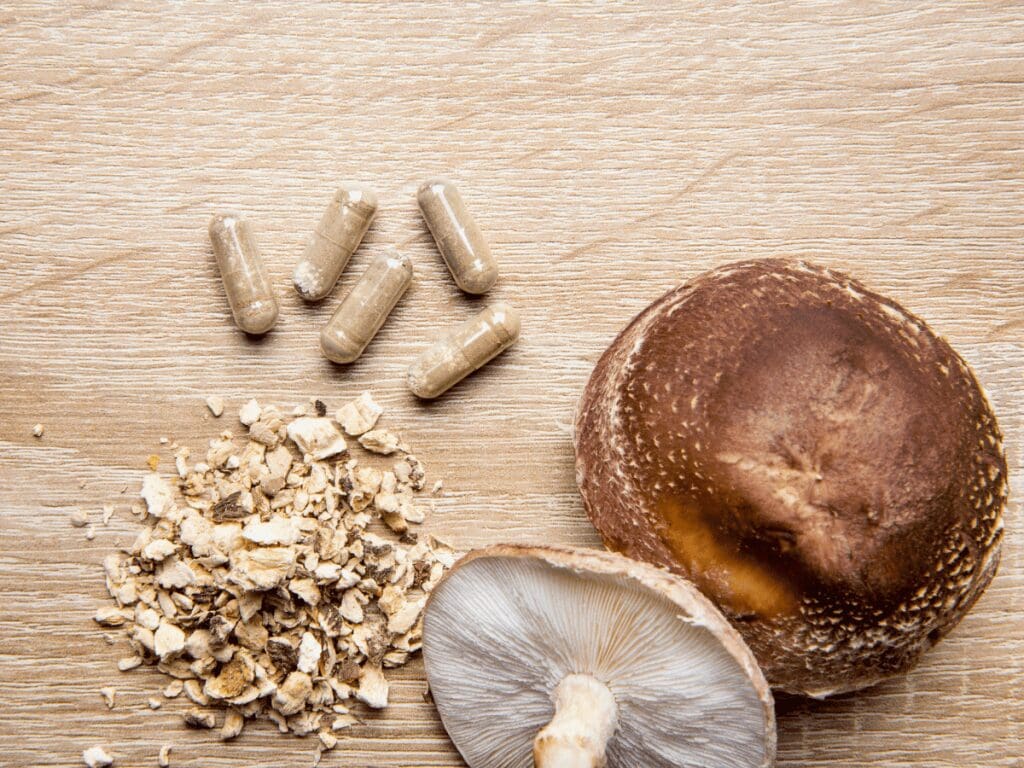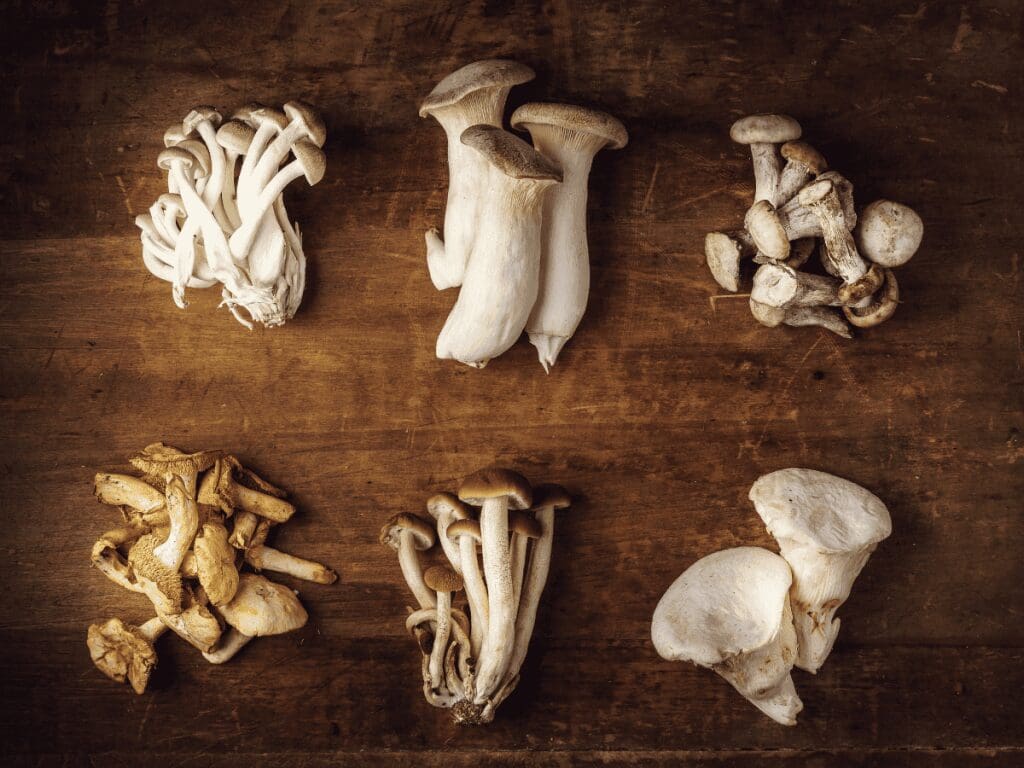Key Takeaways:
- Variety of Health Benefits: Medicinal mushrooms like Reishi, Shiitake, and Lion’s Mane offer unique benefits ranging from immune support to cognitive enhancement.
- Nutritional Powerhouses: Mushrooms are rich in essential vitamins and minerals, including B vitamins and antioxidants, which protect against cellular damage and support overall health.
- Quality and Safety: Choosing high-quality, organic mushrooms and consulting with healthcare professionals are crucial steps to safely incorporating mushrooms into your diet.
As an industry leader, HappyHemp excels in curating botanical solutions for individuals interested in natural wellness. Today, we highlight the role of medicinal mushrooms as natural health enhancement. These fungi are revered not just as delectable food sources but also for their extraordinary immune-supporting and wellness-promoting properties, evolving beyond culinary use to become key components of holistic health.
This article serves as your guide to understanding medicinal mushrooms, detailing their nutritional benefits and practical inclusion in everyday diets. Whether you are already pursuing a health-centric lifestyle or are just beginning to consider mushrooms as nutritional allies, our insights will equip you with the knowledge to intelligently integrate these fungi into your wellness regimen.
As you embrace the power of medicinal mushrooms, Happy Hemp invites you to try our Amanita Muscaria Mushroom Gummies, a perfect addition to any wellness regimen. These gummies offer the nutritional benefits of medicinal mushrooms in a convenient and enjoyable form, ensuring you can maintain your journey to health with ease and a touch of sweetness.
Top Health-Boosting Mushrooms
Types Of Medicinal Mushrooms
Some of the most popular medicinal mushrooms include Reishi, known for its calming effects and immune support; Shiitake, favored for cardiovascular health and anti-cancer properties; and Lion’s Mane, which is believed to enhance cognitive function and nerve health. These mushrooms have been used in traditional medicine for centuries, and recent studies are beginning to back up these historical claims with scientific evidence.
Comparing Shiitake, Reishi, And Chaga
- Shiitake Mushrooms: Shiitake is not only a culinary favorite but also a staple in medicinal mushroom use, particularly known for its ability to support heart health and improve circulation. Rich in eritadenine and beta-glucans, Shiitake helps to lower cholesterol and boost the immune system. Its versatility in cooking makes it an easy addition to daily diets, enhancing dishes with a rich, umami flavor.
- Reishi Mushrooms: Reishi, often referred to as the “mushroom of immortality,” are sought after for their extensive health benefits, particularly in boosting immune function and combating fatigue. Unlike Shiitake, Reishi are not commonly used in cooking due to their tough texture and bitter taste. Instead, they are typically taken in the form of teas, powders, or extracts. Their adaptogenic properties, which help the body fight stress and balance energy, make them indispensable in holistic health practices.
- Chaga Mushrooms: Chaga grows primarily on birch trees in cold climates and is consumed mostly in the form of tea or extract. It is renowned for its impressive antioxidant content, which is among the highest of any food. Chaga is particularly valued for its potential to reduce inflammation and support immune health, as well as its ability to lower blood sugar and cholesterol levels. Its earthy taste is much milder than Reishi, making it more versatile in beverage applications.
Emerging Research On Mushroom Benefits
Research into the health benefits of mushrooms is expanding, with studies showing promising results in various areas. For instance, polysaccharides found in these fungi are known to help boost your immune system. Other research points to the potential of mushrooms in fighting cancer cells, improving brain health, and reducing the risk of chronic diseases.
Nutritional Benefits Of Each Mushroom
Vitamins And Minerals In Mushrooms
Mushrooms are a low-calorie source of fiber, protein, and antioxidants. They are one of the few non-animal sources of vitamin D, especially when exposed to sunlight, which enhances their vitamin D content. Additionally, mushrooms provide several B vitamins such as riboflavin (B2), folate (B9), thiamine (B1), pantothenic acid (B5), and niacin (B3) that are essential for energy production and brain health. They also contain essential minerals like selenium, potassium, and copper, which support various bodily functions including the immune system and heart health.
Antioxidant Properties Of Mushrooms
The antioxidant content of mushrooms helps to combat oxidative stress and reduce inflammation in the body. This is particularly true for varieties like Chaga and Reishi. Antioxidants such as ergothioneine and glutathione in mushrooms are potent defenders against cellular damage and have been linked to lowered risks of chronic diseases such as heart disease, Alzheimer’s, and cancer.
Mushrooms And Immune Support
Mushrooms are rich in polysaccharides, specifically beta-glucans, which are known to help stimulate the immune system and enhance its ability to fight off infections. By promoting the activity of natural killer cells and other immune responses, mushrooms such as Shiitake and Maitake can be particularly beneficial during the cold and flu season, as well as for overall immune resilience.
How To Incorporate Mushrooms Into Your Diet
Recipes For Mushroom Dishes
Incorporating mushrooms into your diet can be both delicious and nutritious. Start with simple recipes like sautéed mushrooms, which can be a versatile side dish, or incorporate them into soups, stews, and sauces for added flavor and texture. For a more filling option, try stuffing large portobello mushrooms with vegetables and baking them, or adding sliced mushrooms to pasta dishes and stir-fries.
Mushroom Supplements And Extracts
For those looking to gain the medicinal benefits of mushrooms without altering their diet too much, supplements and extracts can be an excellent alternative. Available in forms such as powders, capsules, and tinctures, these products often contain concentrated amounts of key bioactive compounds found in mushrooms, such as polysaccharides. It’s important, however, to choose supplements that are certified for purity and free from contaminants to ensure safety and effectiveness.

Daily Recommendations For Mushroom Intake
While there’s no one-size-fits-all answer for how many mushrooms one should consume, a general guideline is to include them several times a week in your diet to benefit from their nutritional properties. Depending on the type and form of mushroom, dosages in supplements can vary, so it’s advisable to follow product-specific recommendations or consult with a healthcare provider for personalized advice.
What To Look For When Choosing Quality Mushrooms
Organic Vs. Non-Organic Mushrooms
When selecting mushrooms, one of the key decisions is whether to choose organic or non-organic. Organic mushrooms are grown without synthetic pesticides and fertilizers, which is not only better for your health but also for the environment. They are often considered to have a superior taste and nutritional profile. However, non-organic mushrooms can be just as nutritious if grown under controlled conditions. These mushrooms are usually more affordable too.
Mushroom Sources
It’s important to know where your mushrooms are coming from and how they are grown. Locally sourced mushrooms can be fresher and thus retain more nutrients. If possible, purchase mushrooms from trusted farms or suppliers who transparently share their farming practices. This ensures that you are getting a product that is not only fresh but also cultivated in a sustainable manner.
Identifying Fresh And High-Quality Mushrooms
Fresh mushrooms should have a firm texture, a smooth appearance, and no damp or slimy spots. Avoid mushrooms that appear wrinkled or have a pungent smell as these can be signs of decay. For dried mushrooms, ensure they are properly sealed in air-tight packaging to protect them from moisture and to preserve their flavor and medicinal properties.
Environmental Impact Of Mushroom Cultivation
Sustainable Farming Practices
Eco-friendly mushroom cultivation employs methods that include reducing water use, preventing soil erosion, and avoiding the use of synthetic pesticides and fertilizers, which are harmful to both the soil and the waterways. Sustainable farms also focus on maintaining local biodiversity, which helps to support a wide range of wildlife and plant species, creating a healthier ecosystem. By implementing crop rotation and organic waste recycling, these farms enhance soil fertility and reduce waste.
The Carbon Footprint Of Mushroom Production
Although mushroom cultivation typically has a lower carbon footprint compared to other forms of agriculture, the specific practices employed can significantly affect its environmental impact. Traditional mushroom farming can involve the use of climate-controlled growing environments, which may consume a lot of energy depending on the source of that energy. On the other hand, organic and local mushroom farms often utilize natural processes and locally sourced materials, which greatly reduce their reliance on fossil fuels. Promoting these practices can lead to a substantial decrease in overall carbon emissions from the agriculture sector.
Consumer Choices And Environmental Impact
The choices consumers make can have a profound impact on agricultural practices and, consequently, on the environment. Opting for mushrooms that are grown locally can help cut down on greenhouse gas emissions and support local economies. Purchasing mushrooms from sources that employ sustainable farming techniques can also drive broader adoption of these practices, as it increases demand for environmentally friendly products. Furthermore, consumers can influence the market by demanding more transparency about the cultivation methods used, which can lead to more farms adopting sustainable practices over time.
Safety Considerations When Using Mushrooms
Common Allergies And Side Effects
While mushrooms are safe for most people, they can cause allergic reactions in some individuals. Common symptoms include skin rashes, digestive discomfort, and respiratory issues. It’s important to start with small amounts when trying new types of mushrooms to monitor your body’s response. Additionally, some mushrooms, especially wild varieties, can be toxic if misidentified, so always ensure your mushrooms are sourced from reliable providers.
Interactions With Medications
Mushrooms like Reishi and Chaga can interact with certain medications, including blood thinners and immune-suppressing drugs. These interactions can enhance or inhibit the effects of your medications, potentially leading to health risks. Always consult with a healthcare professional before starting any new mushroom-based supplements, especially if you are on medication.
Best Practices For Mushroom Consumption
To safely enjoy the benefits of mushrooms, follow these best practices:
- Cook Mushrooms Properly: Always cook mushrooms properly to eliminate potential toxins and ease digestion.
- Choose Reputable Sources: Purchase mushrooms from reputable sources to avoid contamination with pesticides or harmful fungi.
- Forage with Caution: If foraging for wild mushrooms, do so with an expert or use a reliable guidebook, as some edible mushrooms have toxic look-alikes.
- Store Mushrooms Correctly: Properly store mushrooms in a cool, dry place or in the refrigerator to preserve their flavor, nutritional value, and medicinal properties.

Final Thoughts
Mushrooms offer a unique blend of flavor and medicinal benefits that can enhance your health. From boosting your immune system to supporting cognitive function, the diverse range of mushrooms available today makes it easy to find one that fits your health needs. Remember to choose high-quality, fresh mushrooms and consult with healthcare professionals when necessary to maximize the benefits and ensure safety.
Read also:
- Can CBD Be Given with Mushroom Supplements?
- Unlocking the Power of Mushroom Supplements: Immune Support and Cognitive Enhancement
- Discover the Power of Happy Hemp’s Amanita Muscaria Mushroom Gummies: A New Dimension in Natural Wellness
Frequently Asked Questions About Best Mushrooms For Health
Which mushrooms are best for boosting the immune system?
Turkey Tail, Reishi, and Shiitake mushrooms are particularly renowned for their immune-enhancing properties.
Can mushrooms help with stress and anxiety?
Reishi and Lion’s Mane mushrooms have adaptogenic qualities that help the body manage stress and may alleviate symptoms of anxiety.
Are there mushrooms that support brain health?
Lion’s Mane is beneficial for cognitive functions, potentially aiding in memory and nerve health.
What mushrooms are known for their cancer-fighting properties?
Chaga, Reishi, and Turkey Tail mushrooms have been studied for their potential to combat cancer.
Which mushrooms can improve heart health?
Reishi mushrooms have properties that may protect the cardiovascular system.
Are any mushrooms good for skin health?
Tremella mushrooms are used for their skin-hydrating benefits due to their ability to retain water.
What mushrooms are beneficial for hormonal health?
Maitake and Reishi can help balance hormones, particularly during stress and menopause.
Can mushrooms support digestive health?
Mushrooms like Turkey Tail and Shiitake are beneficial for gut health due to their fiber content and probiotic properties.
Which mushrooms are good for bone health?
Morel mushrooms are rich in calcium, supporting bone health and preventing osteoporosis.
What are the best mushrooms for liver health?
Reishi mushrooms are traditionally used to support liver function and detoxification.
Sources:
- Malík, M., & Tlustoš, P. (2022). Nootropics as Cognitive Enhancers: Types, Dosage and Side Effects of Smart Drugs. Nutrients, 14(16), 3367. https://doi.org/10.3390/nu14163367
- Muszyńska, B., Grzywacz-Kisielewska, A., Kała, K., & Gdula-Argasińska, J. (2018). Anti-inflammatory properties of edible mushrooms: A review. Food Chemistry, 243, 373–381. https://doi.org/10.1016/j.foodchem.2017.09.149
- Valverde, M. E., Hernández-Pérez, T., & Paredes-López, O. (2015). Edible Mushrooms: Improving Human Health and Promoting Quality Life. International Journal of Microbiology, 2015(376387), 1–14. https://doi.org/10.1155/2015/376387







